Sipuleucel-T
Editor-In-Chief: C. Michael Gibson, M.S., M.D. [1]; Associate Editor(s)-in-Chief: Alberto Plate [2]
Disclaimer
WikiDoc MAKES NO GUARANTEE OF VALIDITY. WikiDoc is not a professional health care provider, nor is it a suitable replacement for a licensed healthcare provider. WikiDoc is intended to be an educational tool, not a tool for any form of healthcare delivery. The educational content on WikiDoc drug pages is based upon the FDA package insert, National Library of Medicine content and practice guidelines / consensus statements. WikiDoc does not promote the administration of any medication or device that is not consistent with its labeling. Please read our full disclaimer here.
Overview
Sipuleucel-T is an immunological agent that is FDA approved for the treatment of asymptomatic or minimally symptomatic metastatic castrate resistant (hormone refractory) prostate cancer. Common adverse reactions include nausea, vomiting, anemia, backache, headache, citrate adverse reaction, fatigue, fever, Infusion reaction, pain, rigor, shivering.
Adult Indications and Dosage
FDA-Labeled Indications and Dosage (Adult)
Dose and Schedule
- Each dose of Sipuleucel-T contains a minimum of 50 million autologous CD54+ cells activated with PAP-GM-CSF.
- The recommended course of therapy for Sipuleucel-T is 3 complete doses, given at approximately 2-week intervals. In controlled clinical trials, the median dosing interval between infusions was 2 weeks (range 1 to 15 weeks); the maximum dosing interval has not been established.
- If, for any reason, the patient is unable to receive a scheduled infusion of Sipuleucel-T the patient will need to undergo an additional leukapheresis procedure if the course of treatment is to be continued. Patients should be advised of this possibility prior to initiating treatment.
Premedication
- To minimize potential acute infusion reactions such as chills and/or fever, it is recommended that patients be premedicated orally with acetaminophen and an antihistamine such as diphenhydramine approximately 30 minutes prior to administration of Sipuleucel-T.
Handling Precautions for Control of Infectious Disease
- Sipuleucel-T is not routinely tested for transmissible infectious diseases. Therefore, patient leukapheresis material and Sipuleucel-T may carry the risk of transmitting infectious diseases to health care professionals handling the product. Employ universal precautions in handling leukapheresis material or Sipuleucel-T.
Storage
- The Sipuleucel-T infusion bag must remain within the insulated polyurethane container until the time of administration. Do not remove the insulated polyurethane container from the outer cardboard shipping box.
Confirm Product Release Before Infusion
- Do not infuse Sipuleucel-T until confirmation of product release has been received from Dendreon. Dendreon will send a cell product disposition form containing the patient identifiers, expiration date and time, and the disposition status (approved for infusion or rejected), to the infusion site.
Confirm Patient Identity
- Sipuleucel-T is intended solely for autologous use. Confirm the proper product has been received according to the label on the outside of the insulated polyurethane container. Prior to Sipuleucel-T infusion, match the patient's identity with the patient identifiers on the cell product disposition form and the Sipuleucel-T infusion bag.
Inspect the Infusion Bag
- Remove the infusion bag from the insulated polyurethane container and inspect the bag for signs of leakage. Do not administer if the bag leaks.
- Contents of the bag will be slightly cloudy, with a cream-to-pink color. Gently mix and re-suspend the contents of the bag, inspecting for clumps and clots. Small clumps of cellular material should disperse with gentle manual mixing. Do not administer if the bag leaks during handling or if clumps remain in the bag.
Administration
- Infusion must begin prior to the expiration date and time indicated on the cell product disposition form and Product Label. Do not initiate infusion of expired Sipuleucel-T.
- Administer Sipuleucel-T via intravenous infusion over a period of approximately 60 minutes. Do not use a cell filter. Sipuleucel-T is supplied in a sealed, patient-specific infusion bag; the entire volume of the bag should be infused.
- Observe the patient for at least 30 minutes following each infusion.
Administration Modification for Infusion Reactions
- Acute infusion reactions such as chills, fatigue, fever, nausea, and joint ache were frequently observed in studies of Sipuleucel-T To mitigate such reactions, premedication, consisting of acetaminophen and an antihistamine such as diphenhydramine, was administered in clinical studies prior to infusion.
- In the event of an acute infusion reaction, the infusion may be interrupted or slowed, depending on the severity of the reaction. Appropriate medical therapy should be administered as needed. In controlled clinical trials, symptoms of acute infusion reactions were treated with acetaminophen, intravenous H1 and/or H2 blockers, and low dose intravenous meperidine.
- If the infusion of Sipuleucel-T must be interrupted, the infusion should not be resumed if the Sipuleucel-T infusion bag will be held at room temperature for more than 3 hours.
Off-Label Use and Dosage (Adult)
Guideline-Supported Use
There is limited information regarding Off-Label Guideline-Supported Use of Sipuleucel-T in adult patients.
Non–Guideline-Supported Use
There is limited information regarding Off-Label Non–Guideline-Supported Use of Sipuleucel-T in adult patients.
Pediatric Indications and Dosage
FDA-Labeled Indications and Dosage (Pediatric)
There is limited information regarding Sipuleucel-T FDA-Labeled Indications and Dosage (Pediatric) in the drug label.
Off-Label Use and Dosage (Pediatric)
Guideline-Supported Use
There is limited information regarding Off-Label Guideline-Supported Use of Sipuleucel-T in pediatric patients.
Non–Guideline-Supported Use
There is limited information regarding Off-Label Non–Guideline-Supported Use of Sipuleucel-T in pediatric patients.
Contraindications
None
Warnings
Acute Infusion Reactions
- Acute infusion reactions (reported within 1 day of infusion) included, but were not limited to, fever, chills, respiratory events (dyspnea, hypoxia, and bronchospasm), nausea, vomiting, fatigue, hypertension, and tachycardia. In controlled clinical trials, 71.2% of patients in the Sipuleucel-T group developed an acute infusion reaction. The most common events (≥ 20%) were chills, fever, and fatigue. In 95.1% of patients reporting acute infusion reactions, the events were mild or moderate. Fevers and chills generally resolved within 2 days (71.9% and 89.0%, respectively).
- In controlled clinical trials, severe (Grade 3) acute infusion reactions were reported in 3.5% of patients in the Sipuleucel-T group. Reactions included chills, fever, fatigue, asthenia, dyspnea, hypoxia, bronchospasm, dizziness, headache, hypertension, muscle ache, nausea, and vomiting. The incidence of severe events was greater following the second infusion (2.1% vs. 0.8% following the first infusion), and decreased to 1.3% following the third infusion. Some (1.2%) patients in the Sipuleucel-T group were hospitalized within 1 day of infusion for management of acute infusion reactions. No Grade 4 or 5 acute infusion reactions were reported in patients in the Sipuleucel-T group.
- Closely monitor patients with cardiac or pulmonary conditions. In the event of an acute infusion reaction, the infusion rate may be decreased, or the infusion stopped, depending on the severity of the reaction. Appropriate medical therapy should be administered as needed.
Handling Precautions for Control of Infectious Disease
- Sipuleucel-T is not routinely tested for transmissible infectious diseases. Therefore, patient leukapheresis material and Sipuleucel-T may carry the risk of transmitting infectious diseases to health care professionals handling the product. Accordingly, health care professionals should employ universal precautions when handling leukapheresis material or Sipuleucel-T.
Concomitant Chemotherapy or Immunosuppressive Therapy
- Use of either chemotherapy or immunosuppressive agents (such as systemic corticosteroids) given concurrently with the leukapheresis procedure or Sipuleucel-T has not been studied. Sipuleucel-T is designed to stimulate the immune system, and concurrent use of immunosuppressive agents may alter the efficacy and/or safety of Sipuleucel-T Therefore, patients should be carefully evaluated to determine whether it is medically appropriate to reduce or discontinue immunosuppressive agents prior to treatment with Sipuleucel-T.
Product Safety Testing
- Sipuleucel-T is released for infusion based on the microbial and sterility results from several tests: microbial contamination determination by Gram stain, endotoxin content, and in-process sterility with a 2-day incubation to determine absence of microbial growth. The final (7-day incubation) sterility test results are not available at the time of infusion. If the sterility results become positive for microbial contamination after Sipuleucel-T has been approved for infusion, Dendreon will notify the treating physician. Dendreon will attempt to identify the microorganism, perform antibiotic sensitivity testing on recovered microorganisms, and communicate the results to the treating physician. Dendreon may request additional information from the physician in order to determine the source of contamination.
Adverse Reactions
Clinical Trials Experience
Because clinical trials are conducted under widely varying conditions, adverse reaction rates observed in the clinical trials of a drug cannot be directly compared to rates in the clinical trials of another drug and may not reflect the rates observed in practice. The safety evaluation of Sipuleucel-T is based on 601 prostate cancer patients in the Sipuleucel-T group who underwent at least 1 leukapheresis procedure in four randomized, controlled clinical trials. The control was non-activated autologous peripheral blood mononuclear cells.
- Almost all (98.3%) patients in the Sipuleucel-T group and 96.0% in the control group reported an adverse event. The most common adverse events, reported in patients in the Sipuleucel-T group at a rate ≥ 15%, were chills, fatigue, fever, back pain, nausea, joint ache, and headache. In 67.4% of patients in the Sipuleucel-T group, these adverse events were mild or moderate in severity. Severe (Grade 3) and life-threatening (Grade 4) adverse events were reported in 23.6% and 4.0% of patients in the Sipuleucel-T group compared with 25.1% and 3.3% of patients in the control group. Fatal (Grade 5) adverse events were reported in 3.3% of patients in the Sipuleucel-T group compared with 3.6% of patients in the control group. The most common (≥ 2%) Grade 3-5 adverse events reported in the Sipuleucel-T group were back pain and chills.
- Serious adverse events were reported in 24.0% of patients in the Sipuleucel-T group and 25.1% of patients in the control group. Serious adverse events in the Sipuleucel-T group included acute infusion reactions, cerebrovascular events, and single case reports of eosinophilia, rhabdomyolysis, myasthenia gravis, myositis, and tumor flare.
- Sipuleucel-T was discontinued in 1.5% of patients in Study 1 due to adverse events. Some patients who required central venous catheters for treatment with Sipuleucel-T developed infections, including sepsis. A small number of these patients discontinued treatment as a result. Monitoring for infectious sequelae in patients with central venous catheters is recommended.
- Each dose of Sipuleucel-T requires a standard leukapheresis procedure approximately 3 days prior to the infusion. Adverse events that were reported ≤ 1 day following a leukapheresis procedure in ≥ 5% of patients in controlled clinical trials included citrate toxicity (14.2%), oral paresthesia (12.6%), paresthesia (11.4%), and fatigue (8.3%).
TABLE 1 provides the frequency and severity of adverse events reported in ≥ 5% of patients in the Sipuleucel-T group of randomized, controlled trials of men with prostate cancer. The population included 485 patients with metastatic castrate resistant prostate cancer and 116 patients with non-metastatic androgen dependent prostate cancer who were scheduled to receive 3 infusions of Sipuleucel-T at approximately 2-week intervals. The population was age 40 to 91 years (median 70 years), and 90.6% of patients were Caucasian.
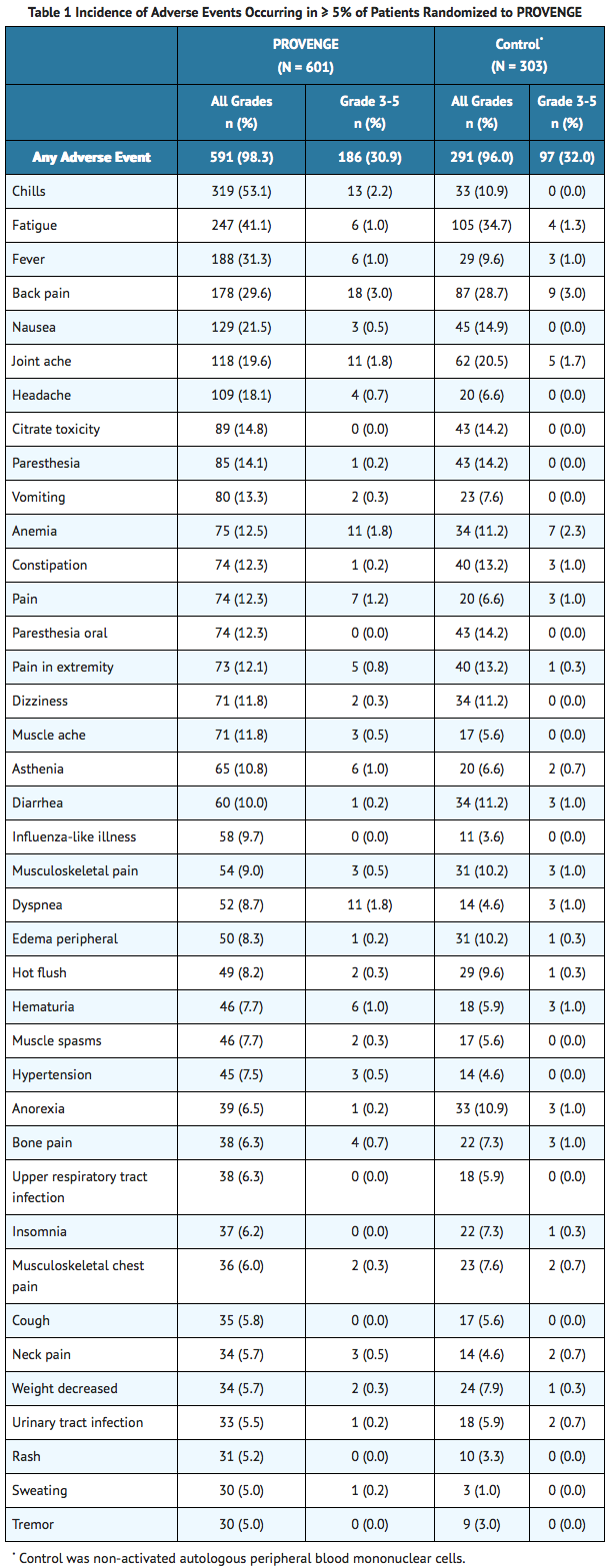
Cerebrovascular Events
- In controlled clinical trials, cerebrovascular events, including hemorrhagic and ischemic strokes, were observed in 3.5% of patients in the Sipuleucel-T group compared with 2.6% of patients in the control group.
Postmarketing Experience
There is limited information regarding Sipuleucel-T Postmarketing Experience in the drug label.
Drug Interactions
- No studies of drug interactions have been performed with Sipuleucel-T.
Use in Specific Populations
Pregnancy
Pregnancy Category (FDA):
There is no FDA guidance on usage of Sipuleucel-T in women who are pregnant.
Pregnancy Category (AUS):
There is no Australian Drug Evaluation Committee (ADEC) guidance on usage of Sipuleucel-T in women who are pregnant.
Labor and Delivery
There is no FDA guidance on use of Sipuleucel-T during labor and delivery.
Nursing Mothers
There is no FDA guidance on the use of Sipuleucel-T in women who are nursing.
Pediatric Use
There is no FDA guidance on the use of Sipuleucel-T in pediatric settings.
Geriatic Use
In controlled clinical trials, 72.9% of patients (438 of 601) in the Sipuleucel-T group were ≥ 65 years of age. There were no apparent differences in the safety of Sipuleucel-T between patients ≥ 65 years of age and younger patients.
In a survival analysis of the controlled clinical trials of Sipuleucel-T in metastatic castrate resistant prostate cancer, 78.3% of randomized patients (382 of 488) were ≥ 65 years of age. The median survival of patients in the Sipuleucel-T group ≥ 65 years of age was 23.4 months (95% confidence interval 22.0, 27.1), compared with 17.3 months in the control group (95% confidence interval: 13.5, 21.5).
Gender
There is no FDA guidance on the use of Sipuleucel-T with respect to specific gender populations.
Race
In controlled clinical trials, 90.6% of patients were Caucasian, 5.8% were African American, and 3.7% were “Other”. Due to the low numbers of non-Caucasian patients in the trials, no conclusions can be made regarding the safety or efficacy of Sipuleucel-T by race.
Renal Impairment
There is no FDA guidance on the use of Sipuleucel-T in patients with renal impairment.
Hepatic Impairment
There is no FDA guidance on the use of Sipuleucel-T in patients with hepatic impairment.
Females of Reproductive Potential and Males
There is no FDA guidance on the use of Sipuleucel-T in women of reproductive potentials and males.
Immunocompromised Patients
There is no FDA guidance one the use of Sipuleucel-T in patients who are immunocompromised.
Administration and Monitoring
Administration
There is limited information regarding Sipuleucel-T Administration in the drug label.
Monitoring
There is limited information regarding Sipuleucel-T Monitoring in the drug label.
IV Compatibility
There is limited information regarding the compatibility of Sipuleucel-T and IV administrations.
Overdosage
- Each Sipuleucel-T infusion comprises the maximum number of cells that can be manufactured from a single leukapheresis procedure. The number of cells in Sipuleucel-T does not exceed the number of cells collected from the leukapheresis. There are no known instances of overdosage from either a single infusion or a full course of therapy with Sipuleucel-T.
Pharmacology
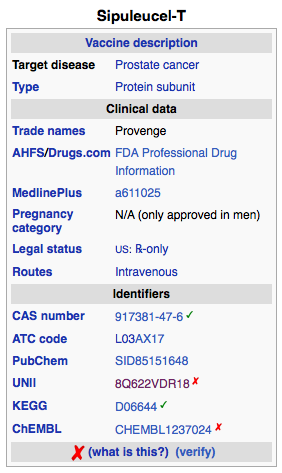
Mechanism of Action
There is limited information regarding Sipuleucel-T Mechanism of Action in the drug label.
Structure
There is limited information regarding Sipuleucel-T Structure in the drug label.
Pharmacodynamics
- Sipuleucel-T is classified as an autologous cellular immunotherapy. While the precise mechanism of action is unknown, Sipuleucel-T is designed to induce an immune response targeted against PAP, an antigen expressed in most prostate cancers. During ex vivo culture with PAP-GM-CSF, APCs take up and process the recombinant target antigen into small peptides that are then displayed on the APC surface.
- In Study 1, 237 out of the 512 patients randomized were evaluated for the development of humoral and T cell immune responses (proliferative and gamma-interferon (γIFN) ELISPOT) to the target antigens at Baseline, and at Weeks 6, 14, and 26. Antibody (IgM and IgG) responses against PAP-GM-CSF and PAP antigen alone were observed through the follow-up period in the Sipuleucel-T group. Neutralizing antibody responses to GM-CSF were transient. T cell proliferative and γIFN ELISPOT responses to PAP-GM-CSF fusion protein were observed in cells collected from peripheral blood of patients through the follow-up period in the Sipuleucel-T treatment group but not in controls. In some patients a response to PAP antigen alone was observed. No conclusions could be made regarding the clinical significance of the observed immune responses.
Pharmacokinetics
There is limited information regarding Sipuleucel-T Pharmacokinetics in the drug label.
Nonclinical Toxicology
Carcinogenesis, Mutagenesis, Impairment of Fertility
- No carcinogenicity or mutagenicity studies of Sipuleucel-T in animals were conducted. No studies on the effects of Sipuleucel-T on fertility have been conducted.
Clinical Studies
The effect of Sipuleucel-T on patients with metastatic castrate resistant (hormone refractory) prostate cancer was studied in three similar randomized, double-blind, placebo-controlled, multicenter trials. Following randomization, patients from both treatment groups underwent a series of 3 leukapheresis procedures (at approximately Weeks 0, 2, and 4). Each leukapheresis was followed approximately 3 days later by infusion of Sipuleucel-T or control. The control was autologous peripheral blood mononuclear cells that had not been activated. Following disease progression, patients were treated at the physician's discretion with other anti-cancer interventions.
Study 1
- Study 1 was a randomized, double-blind, placebo-controlled, multicenter trial in patients with asymptomatic or minimally symptomatic metastatic castrate resistant (hormone refractory) prostate cancer. Eligible patients had metastatic disease in the soft tissue and/or bone with evidence of progression either at these sites or by serial Prostate Specific Antigen (PSA) measurements. Exclusion criteria included visceral (liver, lung, or brain) metastases, moderate to severe prostate cancer-related pain, and use of narcotics for cancer-related pain.
- A total of 512 patients were randomized in a 2:1 ratio to receive Sipuleucel-T (n=341) or control (n=171). The median age was 71, and 90% of the patients were Caucasian. Thirty-five percent of patients had undergone radical prostatectomy, 54% had received local radiotherapy, and 82% had received combined androgen blockade. All patients had baseline testosterone levels < 50 ng/mL. Forty-eight percent of patients were receiving bisphosphonates and 18% had received prior chemotherapy, including docetaxel. Eighty-two percent of patients had an ECOG performance status of 0; 58% had primary Gleason scores of four or more; 44% had bone and soft tissue disease; 48% had bone-only disease; 7% had soft tissue-only disease; and 43% had greater than ten bony metastases.
Supportive Studies
- Study 2 was a randomized, double-blind, placebo-controlled, multicenter trial in patients with metastatic castrate resistant prostate cancer and no cancer-related pain. The primary endpoint was time to disease progression; analysis of the primary endpoint did not reach statistical significance. All patients were to be followed for survival; however, the survival analysis was not pre-specified. A third study, similar in design to Study 2, was terminated prior to completion of planned accrual.
Summary of Study Results
- FIGURE 1 and TABLE 2 present overall survival results observed in two randomized, Phase 3 studies of Sipuleucel-T in men with metastatic castrate resistant prostate cancer. The survival findings were consistent across multiple subgroups. Analyses of time to disease progression did not meet statistical significance in any Phase 3 study of Sipuleucel-T.
Figure 1 Kaplan-Meier Overall Survival Curve for Study 1
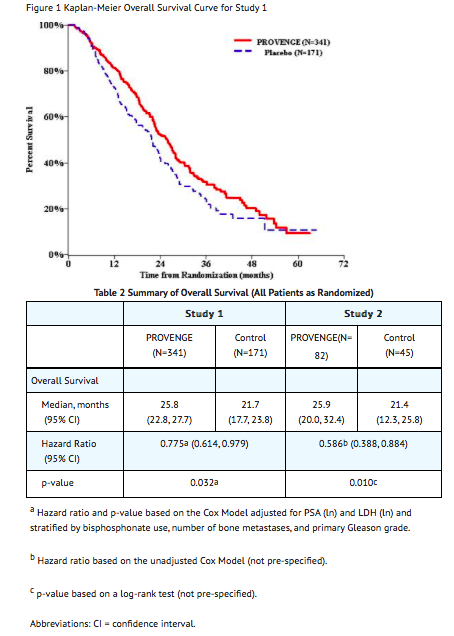
How Supplied
- Sipuleucel-T is a 250 mL suspension containing a minimum of 50 million autologous CD54+ cells activated with PAP-GM-CSF in Lactated Ringer's Injection, USP, and supplied in an infusion bag labeled for the specific recipient.
- NDC 30237-8900-6: one bag individually packed in a carton.
Storage
- Store Refrigerated 2-8°C. DO NOT FREEZE.
Images
Drug Images
{{#ask: Page Name::Sipuleucel-T |?Pill Name |?Drug Name |?Pill Ingred |?Pill Imprint |?Pill Dosage |?Pill Color |?Pill Shape |?Pill Size (mm) |?Pill Scoring |?NDC |?Drug Author |format=template |template=DrugPageImages |mainlabel=- |sort=Pill Name }}
Package and Label Display Panel
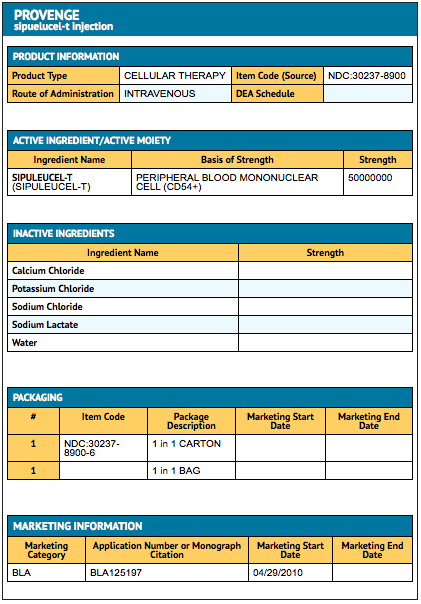
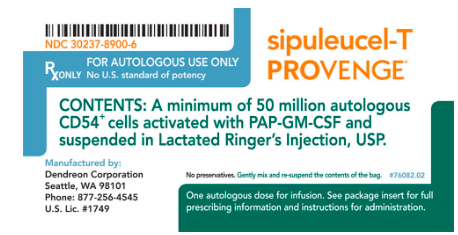
{{#ask: Label Page::Sipuleucel-T |?Label Name |format=template |template=DrugLabelImages |mainlabel=- |sort=Label Page }}
Patient Counseling Information
There is limited information regarding Sipuleucel-T Patient Counseling Information in the drug label.
Precautions with Alcohol
- Alcohol-Sipuleucel-T interaction has not been established. Talk to your doctor about the effects of taking alcohol with this medication.
Brand Names
Look-Alike Drug Names
There is limited information regarding Sipuleucel-T Look-Alike Drug Names in the drug label.
Drug Shortage Status
Price
References
The contents of this FDA label are provided by the National Library of Medicine.